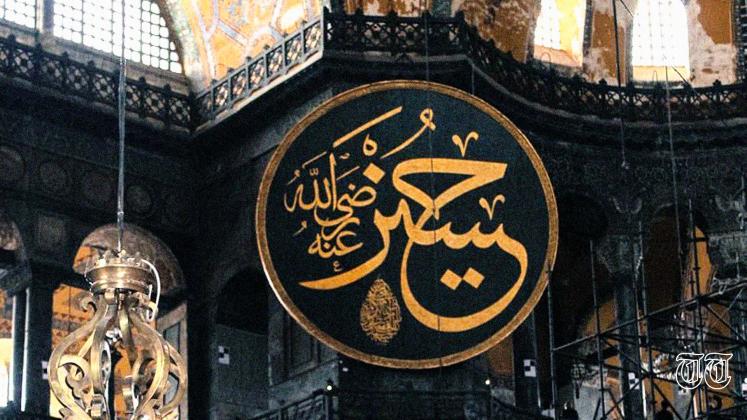اگر ٓاپ بھی بلاگ لکھنا چاہتے ہیں تو اپنی تحریر ای میل کریں — views@thursdaytimes.com
Embracing a framework dependent on truth, equity and freedom is a prerequisite of any general public; Islam, specifically, has laid an uncommon accentuation on the foundation of these qualities. Islam constructs human culture on the establishments of fraternity, uniformity, equity, and opportunity and deliveries it from a wide range of abuse and oppression. This arrangement of equity was advanced and set up completely by Prophet Muhammad (SAW) so that there stayed no extension for foul play and double-dealing. During the hour of the properly directed Caliphs, the Companions and the Ahl-ul-Bayt put forth extraordinary attempts to support this prophetic arrangement of equity and to save it from weakening, yet only twenty years after the Prophet (SAW), numerous shortcomings started to show up in it. The ‘Khilafah’ started to move towards innate autocracy and the rulers started to transform into materialistic rulers. With the start of the standard of the Umayyad administration, the upsides of equity, balance, and devotion started to decrease and the decision class totally got some distance from the prophetic standards of administration, and individuals were left to endure.
In this evolving situation, Imam Hussain (AS) arises as a conspicuous voice for the upliftment of these prophetic rules that actually fill in as a reference point of light for every group of people yet to come. He raised a cry of dissent against this unfairness and forfeited nearly everything to protect the privileges of humankind. As per him, the public authority ought to be totally founded on the beliefs of balance, equity, and freedom as advanced by the Quran and Sunnah.
Allama Iqbal appropriately says: “We have taken the code of Holy Quran from Imam Hussain (AS) and have been gathering flames from his go lighted fire. ”
Imam Hussain (AS) arises as a daring advocate of truth, equity and freedom, and goes to the bleeding edge as a fearless watchman of human respect and opportunity of articulation. By standing firm contrary to the overbearing principle of Yazeed, he enlisted a never-ending challenge to the abhorrent powers and kept the possibility of prophetic administration alive so the local area might have the option to separate between reality and lie.
Maulana Moinuddin Nadvi in his book on Islamic History composes that it was obvious from Imam Hussain’s discourse and activity that his remain against Yazid was for acquiring power as well as for the recovery and reward of the Islamic Khilafah on Prophetic standards. He needed to re-implement the method of administration set up by the Prophet (SAW) in letter and soul. In this undertaking, he was neither enticed by materialistic contemplations nor feared the preliminaries that came in his manner. Consistently, he would depend on Allah and put his confidence in Him. Bidding farewell to the quiet and tranquil air of Madinah, he chose to leave for Kufa and brought the simple word up before the dictators with the goal that the Muslim Ummah is saved from political, social, and good defilement.
Placing his life at serious risk, Imam Hussein (AS), raised a strong cry of dispute against the foundation and presented a specific type of peaceful opposition. Indeed, even today his procedure of showing questions is as yet common in many acculturated social orders without a doubt. He alongside his family and different friends offered the preeminent penance for the upliftment of Truth and made an unmistakable differentiation between Reality and lie. Clearly, he lost the fight yet eternalized himself by representing the heavenly statutes of Shariyah. His model actually fills up the hearts of men with an assurance to work for equity and freedom.
Honouring Imam Hussain (AS), Thomas Carlyle says: “The best lesson which we get from the misfortune of Karbala is that Hussain and his partners were inflexible adherents to God. They represented that the numerical predominance doesn’t check with regards to reality and the lie. The triumph of Hussain notwithstanding his minority wonders me.”
By his person, Imam Hussain (AS) exhibited that a genuine devotee can’t be a captive to anybody with the exception of God. His head can’t bow before any despot. The blood of Imam Hussain (RA) was sufficiently amazing to reverse the situation and the lethargic Ummah was stirred by his stroke.
Today when we discuss a standing firm like a stone against uncalled for authoritarian systems, urging tolerance and showing determination in misfortune, the case of Imam Hussain (AS) is as yet significant. It is the need of great importance to give recognition to the favoured saints of Karbala and the most ideal way would be to live by the heavenly standards for which they set out their lives. We should be accomplices of their motivation and stand firm on the way of equity, freedom, and devotion. They did not just show us how to stand firm against autocracy and illegal intimidation yet in addition how to keep up with the respectability of character in outrageous misfortune. From Karbala, we ought to figure out how to become upright and to pursue setting up a fair society so that there is no space for persecution, unfairness, and abuse.
The views expressed by contributors are their own and are not those of The Thursday Times.






